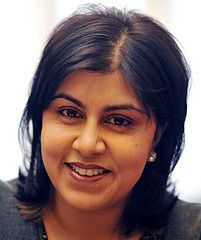Richard Taylor is that rarest of creatures: a genuinely independent political commentator. The conclusion to his article about why candidates for council elections in Cambridge weren’t canvassing in some areas should shock:
I am wondering if the major parties essentially giving up on all but a few wards and by doing so are to all intents and purposes agreeing among themselves who ought be elected in many parts of the city.
So my ears pricked up when, during the BBC’s coverage of the council elections, Conservative Party co-chairman Baroness Warsi (right) remarked on the "interesting" fact that the fall in BNP candidates nationally matched the rise in UKIP candidates "almost exactly". A UKIP spokesman later said she’d suggested a link between the two, but she hadn’t gone that far, as you’ll see if you follow the link above.
I understand her unwillingness to commit. After the 2010 General Election she was the only politician with the chutzpah to accuse Labour of benefitting from electoral fraud in three constituencies, denying the conservatives victory, and was gagged by David Cameron.
Electoral irregularities are on the agenda right now as an investigation gets underway into voting fraud in Tower Hamlets, where police were called to a polling stations after Green candidate Chris Smith said he’d been threatened by a Respect activist. Respect is, of course, the party of George Galloway, the recently-elected MP for Bradford West, where allegations of electoral fraud have also been made.
If the Conservative, Labour and Lib Dems are carving up wards between them like drug-dealers putting dibs on an inner-city housing estate, they deserve what they get when parties like the BNP and UKIP practice a bit of Realpolitik of their own. But the real loser of this election, decided on the lowest turnout for a decade, is democracy.
Gerry Dorrian
300 words

No comments:
Post a Comment